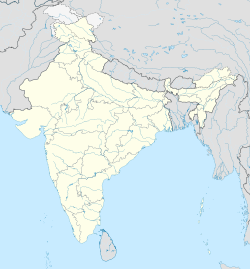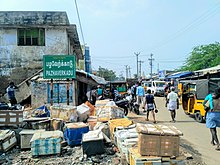Pulicat
| Pulicat பழவேற்காடு |
||
|---|---|---|
|
|
||
| State : |
|
|
| State : | Tamil Nadu | |
| District : | Tiruvallur | |
| Sub-district : | Ponneri | |
| Location : | 13 ° 25 ′ N , 80 ° 19 ′ E | |
| Residents : | 17,925 (2011) | |
| Entrance to the old Dutch cemetery in Pulicat | ||
Pulicat or Pazhaverkadu ( Tamil : பழவேற்காடு Paḻavēṟkāṭu [ ˈpaɻəʋeːrkaːɖɯ ]) is a place in the Indian state of Tamil Nadu .
Pulicat is located on Pulicat Lake 55 kilometers north of Chennai (Madras) in the extreme northeast of Tamil Nadu near the border with the neighboring state of Andhra Pradesh . Pulicat belongs to the Taluk Ponneri of the Tiruvallur district . The place is located at the southern end of Pulicat Lake on the barrier island Sriharikota , which shields the lagoon from the Bay of Bengal . According to the 2011 census, Pulicat has around 18,000 inhabitants and is administered by a village council according to the Panchayat system.
During the colonial period, Pulicat was the most important Dutch base on the Coromandel coast . In 1609 the Dutch East India Company built a fortress here, named Fort Geldria after the province of Gelderland . The Dutch soon came into competition with the British East India Company , which had founded Fort St. George in nearby Madras in 1640 . In the 18th and 19th centuries, Pulicat changed hands several times in the course of the armed conflicts between the British and the Dutch: in the Fourth Anglo-Dutch Sea War , the place was conquered by the British in 1781, but after the Peace of Paris in 1784 it came back a year later the Netherlands. During the First Coalition War , the British conquered Pulicat again in 1795, but ceded it to the Netherlands again in 1818 under the terms of the British-Dutch Treaty of 1814 . After the British and Dutch had demarcated their spheres of interest in Asia in the British-Dutch Treaty of 1824 , Pulicat became finally British in 1825 together with the rest of the Dutch possessions in India.
After the end of the Dutch period, Pulicat fell back to an insignificant village. The old Dutch cemetery is a reminder of the colonial era . Pulicat is also of tourist interest as a starting point for the Pulicat Lake Bird Sanctuary .
literature
- The Imperial Gazetteer of India. Volume 20: Pārdi to Pusad. New edition Clarendon Press, Oxford 1908, pp. 241–242 , keyword: Pulicat Town .


